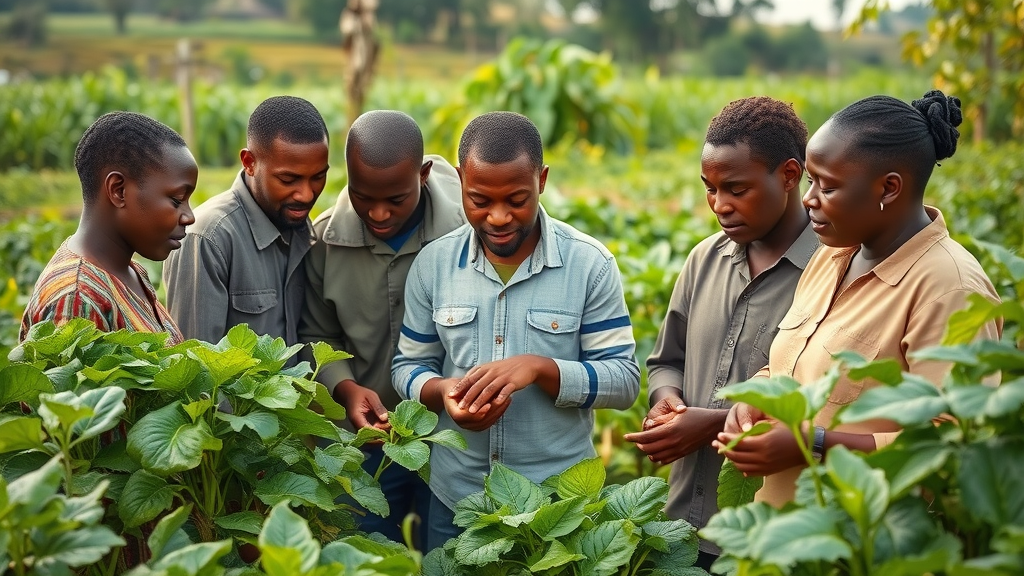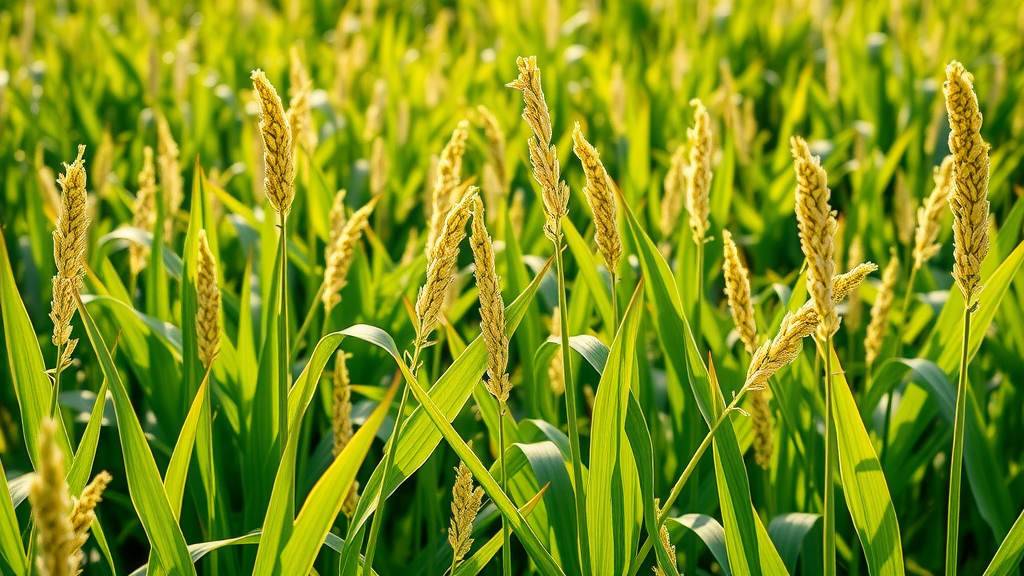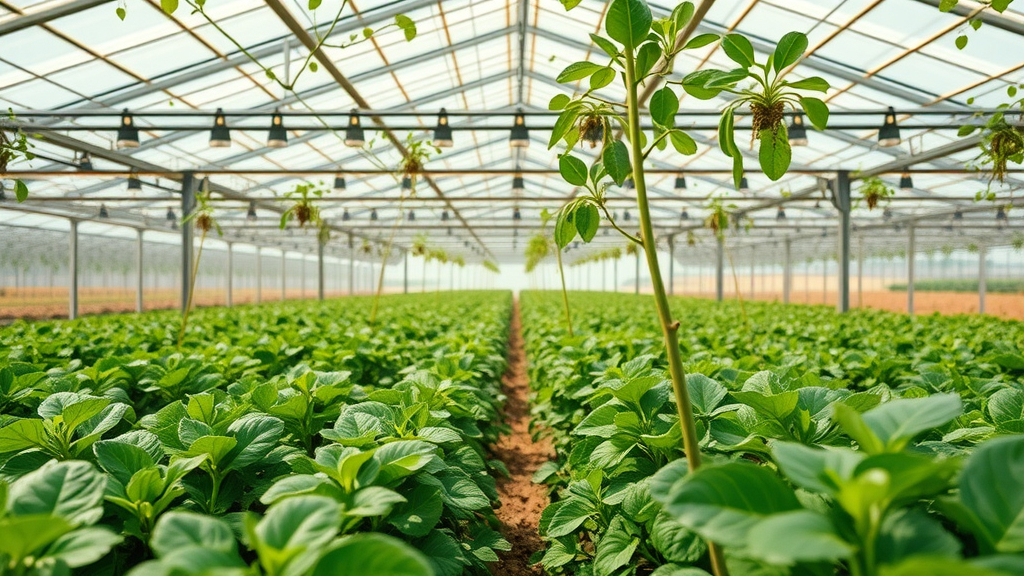Did you know that value addition on crops like lemongrass can multiply farmers' income by thousands compared to selling raw produce? This startling fact is at the core of the agricultural transformation Uganda is witnessing today, spearheaded by pioneering initiatives like Utulivu Naturals. This article explores the innovative farming approaches and value addition strategies reshaping Uganda's agricultural landscape, offering invaluable lessons for farmers and agribusinesses alike.
What You'll Learn
-
The current state and statistics of agriculture transformation Uganda is experiencing.
-
The critical concepts and contextual background driving smart agricultural transformation projects.
-
How Utulivu Naturals' philosophy influences sustainable farming and value addition.
-
Insights into climate smart agricultural practices and their impact.
-
Practical tips for farmers and agribusinesses to harness opportunities in Uganda's evolving agricultural sector.
Startling Facts on Agriculture Transformation Uganda

Uganda’s agriculture sector plays a pivotal role in the country’s socio-economic development, employing over 70% of the population. However, traditional farming methods have limited income potential, often trapping farmers in low-margin cycles. Recent data reveals that farmers integrating value addition and adopting innovative agricultural practices can increase earnings several folds , signaling a paradigm shift in agriculture transformation Uganda. These facts spotlight a growing momentum towards modernizing agriculture to boost productivity, profitability, and sustainability, with smart agricultural transformation projects leading the charge.
Understanding Agriculture Transformation Uganda: Concepts and Context
The Role of Smart Agricultural Transformation Projects in Uganda

Agriculture transformation Uganda is not just about increasing production – it entails holistic modernization that includes technology adoption, knowledge transfer, and the crucial element of value addition. Smart agricultural transformation projects encompass the deployment of climate-smart techniques, precision farming, and community-driven approaches that empower farmers to optimize yield while conserving resources.
These projects emphasize collaboration among farmers, extension workers, and agribusinesses, equipping stakeholders with modern tools and practices. This approach reduces vulnerability to climatic challenges and market volatility — core barriers Ugandan agriculture has faced. By aligning traditional knowledge with scientific innovation, Uganda is fast tracking its agricultural transformation journey.
Utulivu Naturals’ Philosophy and Its Impact on Agricultural Transformation Uganda
“At Utulivu Naturals, our philosophy is rooted in reverence for the natural world and its innate ability to nurture, soothe, and heal,” explains the founder of Utulivu Naturals.
The heart of agriculture transformation Uganda beats strongly within enterprises like Utulivu Naturals Uganda. Founded on the principles of sustainability and respect for nature, Utulivu champions holistic wellness through responsibly sourced ingredients and innovative value addition. This approach not only fosters community empowerment but also enhances the economic viability of farms by transforming raw crops into high-value products.
Hilda Nagujja of Utulivu Naturals Uganda states, “We believe in harnessing nature’s bounty to create products that enhance both physical wellbeing and nurture the soul. Our journey with lemongrass—a crop many overlooked—has been revolutionary, unlocking multiple revenue streams through essential oil production and other value-added products.” This narrative highlights how agriculture transformation Uganda can be spearheaded by entrepreneurial vision grounded in natural resource stewardship.
Value Addition: The Key to Unlocking Agricultural Transformation Uganda

Value addition represents the cornerstone of sustainable agriculture transformation Uganda . By processing lemongrass into essential oils, Utulivu Naturals dramatically increased income potential—illustrating its transformational power. A liter of lemongrass essential oil can fetch thousands of times more than the equivalent weight in raw grass.
This success elevates the narrative for Ugandan farmers: moving beyond raw crops to processed products can stabilize income, create new jobs, and open export opportunities. Importantly, it attracts younger generations to agriculture by aligning with modern market demands and sustainability principles. Investing in value addition infrastructure and skills is thus critical for national agriculture transformation Uganda goals.
Climate Smart Agricultural Practices and Their Role in Uganda’s Agricultural Transformation

Climate smart agriculture is an indispensable facet of the agriculture transformation Uganda strategy. By integrating climate-resilient crops, innovative irrigation systems, and sustainable land management, Ugandan farmers mitigate risks posed by erratic weather patterns and soil degradation.
For instance, modern greenhouses equipped with climate-tech irrigation ensure optimal water use efficiency and year-round production, significantly curbing environmental impact. These practices not only enhance productivity but also preserve natural resources for future generations—fitting seamlessly into agriculture transformation Uganda’s sustainability framework.
Challenges and Opportunities in Smart Agricultural Transformation Projects
Despite impressive gains, challenges remain in scaling smart agricultural transformation projects across Uganda. Issues such as limited access to finance, insufficient technical knowledge, and infrastructural gaps hamper widespread adoption. However, these challenges are balanced by significant opportunities in digital agriculture, innovative financing models, and policy support.
With targeted capacity building and continued investment, these projects can overcome bottlenecks and propel agriculture transformation Uganda to new heights, evidenced by enterprises like Utulivu Naturals that have turned obstacles into opportunities.
Expert Insights: Utulivu Naturals on Transforming Ugandan Agriculture
“If you only plan to sell raw produce, be ready for small margins, slow returns, and heartbreak,” advises the founder of Utulivu Naturals, emphasizing the power of value addition.

Hilda Nagujja of Utulivu Naturals powerfully underscores that agriculture transformation Uganda hinges on a mindset shift—valuing processed goods over raw products to realize real profits. Her insights challenge conventional norms and inspire farmers to embrace innovative agribusiness models. By focusing on quality, sustainability, and transparency, farmers can cultivate not only crops but also long-term economic resilience.
Actionable Tips for Farmers and Agribusinesses in Uganda
-
Focus on value addition to increase profitability: Explore processing raw crops into finished or semi-finished products.
-
Adopt climate smart agricultural techniques: Utilize water-efficient irrigation, resilient crop varieties, and sustainable land use.
-
Engage in community training and education: Participate in workshops and knowledge exchange to boost skills.
-
Explore innovative product development like essential oils: Identify crops suited for processing to unlock market value.
-
Prioritize sustainability and transparency: Build trust with consumers by sharing authentic stories and environmental stewardship.

People Also Ask: Common Questions on Agriculture Transformation Uganda
What are the agricultural innovations in Uganda?
Uganda’s agricultural innovations include the adoption of climate-smart practices, introduction of high-yield and pest-resistant crop varieties, use of mobile technology for market access, and value addition methods such as essential oil distillation and agro-processing.
What is the plan for modernization of agriculture in Uganda?
The modernization plan focuses on integrating technology, improving infrastructure, enhancing farmer education, and promoting value addition to boost productivity, market competitiveness, and sustainability.
What are the obstacles to agricultural modernisation in Uganda?
Key obstacles include limited financing, inadequate extension services, poor infrastructure, resistance to change among smallholder farmers, and vulnerability to climate change impacts.
How can agriculture be improved in Uganda?
Improvements can stem from increased investment in smart agricultural technologies, robust training programs, government support policies, and fostering partnerships between farmers, businesses, and research institutions.
Key Takeaways on Agriculture Transformation Uganda
|
Aspect |
Insight |
Impact |
|---|---|---|
|
Value Addition |
Increases profitability significantly |
Transforms raw produce into high-value products |
|
Climate Smart Agriculture |
Promotes sustainability |
Enhances resilience to climate change |
|
Community Training |
Empowers farmers |
Fosters informed decision-making |
|
Smart Agricultural Projects |
Drive modernization |
Boost economic growth |
Conclusion: Embracing Agriculture Transformation Uganda for a Prosperous Future
Utulivu Naturals’ journey exemplifies the transformative potential of innovative farming and value addition in Uganda’s agricultural sector. Embracing these principles is essential for unlocking enhanced profitability, sustainability, and community empowerment. As Uganda continues on its path to agricultural modernization, farmers, policymakers, and agribusinesses alike must prioritize smart practices, education, and collaboration to ensure a resilient and prosperous future for all.
Watch: The Future of Agriculture Transformation Uganda
Discover Utulivu Naturals Located In Uganda
Utulivu Naturals stands as a beacon of innovation and sustainability in Uganda's agricultural landscape. To learn more about their products and community initiatives, visit their website at www.unaturals.shop .
To further explore the transformative initiatives in Uganda’s agricultural sector, consider the following resources:
-
“Agricultural Digitalization in Ugandan Agriculture” : This article discusses how digital technologies are revolutionizing farming practices in Uganda, enhancing productivity and sustainability. ( unffe.org.ug )
-
“Uganda seeks to bring more smallholder farmers into money economy with new strategy” : This piece outlines Uganda’s Parish Development Model, aimed at integrating subsistence farmers into the formal economy through targeted support and value addition. ( allianceforscience.org )
These resources provide valuable insights into the ongoing efforts and strategies driving agricultural transformation in Uganda.
 Add Row
Add Row  Add
Add 




Write A Comment